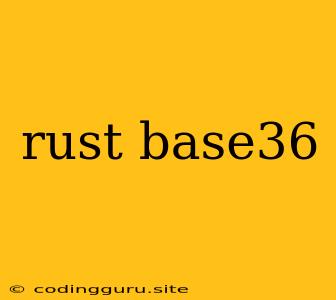Rust and Base36: A Powerful Combination for Unique Identifiers
Rust is a powerful programming language known for its speed, reliability, and safety. One common task in software development is generating unique identifiers. Base36 is a convenient and efficient way to represent these identifiers, especially when dealing with short strings. This article explores the synergy between Rust and Base36, highlighting its advantages and demonstrating how to implement it effectively.
Why Base36?
Base36 utilizes 36 characters for its representation: 0-9 and a-z. This makes it more compact than traditional Base10, and easier to read than Base64. Here's why Base36 shines when working with Rust:
- Compactness: Base36 offers a shorter string representation for the same numerical value compared to Base10. This can be beneficial for storing identifiers in databases, URLs, or other places where space is limited.
- Readability: Base36 is relatively human-readable, making it easier to debug and understand. Unlike Base64, it avoids ambiguous characters like "+" and "/".
- Security: Base36 doesn't introduce any new security vulnerabilities. It simply offers a more efficient way to represent data.
Implementing Base36 in Rust
Rust provides efficient tools for working with different numerical bases. Here's a simple example of converting an integer to Base36:
use std::fmt;
fn main() {
let number = 1234567890;
let base36_string = format!("{:x}", number);
println!("Base36 representation: {}", base36_string);
}
This code snippet uses the format! macro to convert the integer to a hexadecimal (Base16) string. The x format specifier indicates hexadecimal encoding. To achieve Base36, we need to adjust the format specifier to include all 36 characters.
Custom Base36 Implementation
For greater control, you can create your own Base36 conversion function in Rust:
fn base36_encode(number: u64) -> String {
let mut result = String::new();
let base = 36;
let mut n = number;
while n > 0 {
let remainder = n % base;
let digit = if remainder < 10 {
(remainder as u8 + b'0') as char
} else {
(remainder as u8 - 10 + b'a') as char
};
result.push(digit);
n /= base;
}
result.chars().rev().collect()
}
fn main() {
let number = 1234567890;
let base36_string = base36_encode(number);
println!("Base36 representation: {}", base36_string);
}
This code defines a function base36_encode that takes an unsigned 64-bit integer as input and returns a Base36 encoded string. It iteratively calculates the remainder and uses the if statement to map it to the appropriate character (0-9 or a-z). Finally, it reverses the resulting string to obtain the correct Base36 representation.
Working with Libraries
Rust offers numerous libraries that simplify Base36 conversion. The base36 crate provides a concise and efficient solution:
use base36::encode;
fn main() {
let number = 1234567890;
let base36_string = encode(number);
println!("Base36 representation: {}", base36_string);
}
This code imports the encode function from the base36 crate and uses it to convert the integer to a Base36 string. The base36 crate handles the underlying conversion logic, making your code cleaner and more maintainable.
Practical Applications of Base36 in Rust
- Database Identifiers: Base36 is a great choice for generating compact and readable unique identifiers in databases.
- URL Shortening: You can utilize Base36 to encode long URLs into short, memorable strings.
- API Token Generation: Generating API tokens in Base36 offers a more compact and human-readable representation.
Conclusion
Base36 is a valuable tool for working with unique identifiers in Rust. Its compactness, readability, and ease of implementation make it a suitable choice for various scenarios. Whether you use a custom function or a library like base36, Rust empowers you to efficiently handle Base36 encoding and decoding. By choosing the right approach based on your needs and context, you can leverage the power of Rust and Base36 to create robust and efficient applications.
